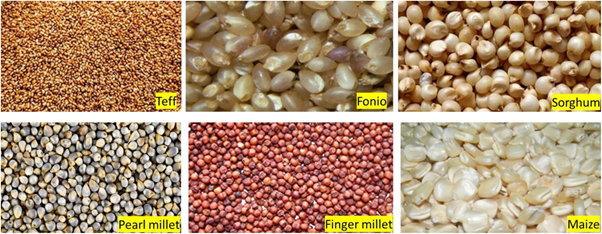

12th August 2022 (7 Topics)
Context
Researchers have identified genes in Africa’s local food crops that can improve resistance to drought and can tolerate heat waves too.
Background
- Countries like India and Pakistan are likely to be affected by the prolonged heatwaves as estimated by the United Nations Environment Programme (UNEP).
- In May 2022, the central government of India has revised the wheat production by 5.7 per cent to 105 million tonnes from 111.32 million tonnes, as the crop productivity has been affected due to the early onset of summer for the year 2021-22.
- As around two-thirds of global calories are derived from three crops mainly, rice, wheat and maize and the reduced crop production becomes a cause of concern for India.
About
- According to the research, Africa can become a major supplier for ‘Orphan grains’.

|
Africa’s arid environment is not suited for crops like rice and maize. Orphan crops like finger millets, little millet; African yam bean, jojoba and jatropha are commonly found in the continent. |
- Scientists had identified genes that were high temperature tolerant, had increased salinity adaptability and had low water requirements that provided essential nutrition in these orphan crops in Africa.
- The breeding strategy of orphan crops could be slightly different from that of staple food crops for which the focus is mainly on yield.
- The domestication syndrome traits in orphan crops are a priority objective that facilitates their adaptation into relatively newer environments and agricultural systems.
- Furthermore, improved processability needs to be focused on for orphan crop products, which depends largely on their physical properties (e.g., amylose to amylopectin in cereal starches) and chemical properties (e.g., anti-nutritional phytates in legumes).
India and Food Security
- According to the Union Budget 2022-23, India’s situation in growth under Agriculture and allied sector has shown a
- As per Fourth Advance Estimates for 2020-21, total food grain production in the country is estimated at a record 308.65 million tonnes which is 11.15 million tonnes higher than that during 2019-20.
- The production of rice, wheat and coarse cereals has increased at compound annual growth rates (CAGR) of 2.7, 2.9 and 4.8 per cent respectively during last six years i.e. 2015-16 to 2020-21. However, the estimated growth has not been achieved.
|
Crop Diversification: a Solution for Food insecurity
|
Promotion of indigenous Crops
The Government of India has approved 2018 as the National Year of Millets to boost production of the nutrient-rich millets and the agro-industries involved in its production. The increased production of Millets will help fight against hunger and mitigate climate change effects in the long run.
Types of Millets in India
- The millets commonly grown in India include; Jowar (sorghum), Bajra (pearl millet), ragi (finger millet), Jhangora (barnyard millet), Barri, Kangni (foxtail/ Italian millet), Kodra (Kodo millet) etc.
- Barnyard Millet is a high source of iron and fibre.
- Finger Millet is a staple that is a very good substitute for oats and cereals. It is known as Ragi in Kannada.
- Little Millet is also loaded with iron and fibre.
- Proso Millet is known as Barri in Hindi.
- Pearl Millet is a high source of proteins, it is known as Bajra in Hindi.

